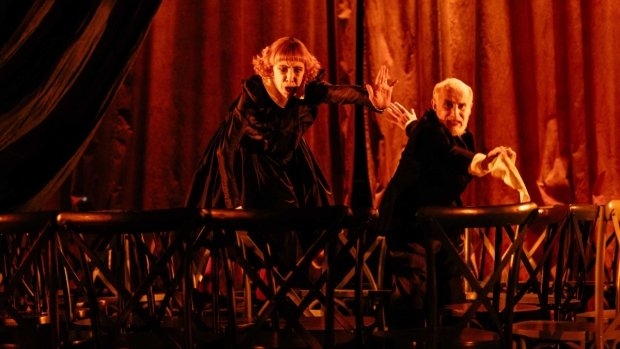The Chairs at Almeida Theatre – review

© Helen Murray
"It's a very odd script," says Kathryn Hunter's Old Woman, voice full of wonder. It is indeed – but very funny and thought-provoking too.
Ionesco's theatre of the absurd hasn't ever been as popular in Britain as in continental Europe. And The Chairs from 1952 is absurd at its most absurdist, featuring as it does an old man and an old woman sitting in a room entirely surrounded by water, setting out chairs for invisible guests. They have invited all the movers and shakers to hear the old man's message – a message to share with all humanity.
Translator Omar Elerian, who also directs, doesn't simply update the story, though there are passing references to Leavers, Remainers and Remoaners, and Mark Zuckerberg. Instead, he elaborates and re-emphasises it for a new audience, adding a layer of stage business and chaos which will feel familiar to those who love comedies that thrive on things that go wrong.
It opens with an extended joke about Marcello Magni (Hunter's real life husband, who plays the Old Man) being overheard through the tannoy having an attack of nerves and threatening to go home – "I should have said no at the beginning" – before being coaxed onto the stage by Hunter and Elerian. This sense of stagey artificiality continues throughout, with interventions from Toby Sedgwick's hangdog stage manager, who hands on props and offers prompts and explanations for certain cuts.
These sections add an edge of vaudevillian slapstick to the Beckett like-bleakness of the couple's existence, where the same story and the same routines are enacted every night. The setting too is deliberately theatrical with Cécile Trémolières and Naomi Kuyek-Cohen's curtains in faded reds and dusty turquoise framing the action; even the chairs are richly coloured under Jackie Shemesh's mood-changing lights.
Within this frame, Magni and Hunter weave pure magic. Like Sedgwick, they are masters of physical theatre, but part of the wonder of The Chairs is that although they entirely welcome you into their imaginary world, their mime is not of the accurate LeCoq type. There's an extended sequence with a teacup when the arrival of a real piece of china undermines the mimed action of drinking; at another point they exit in opposite directions while supposedly carrying an invisible table.
Yet their involvement in their gathering is utterly convincing, whether it is Hunter coquettishly raising her black pleated skirt to show her red-stockinged legs while flirting with an invisible admirer, or Magni performing a charade for the month of February by skiing, skating and shivering. There's charm here and comedy, but also a kind of sadness; their loneliness and thwarted hopefulness is underlined by their vivacity.
Hunter, in red wig with wide, startled eyes, looks at Magni adoringly, trying to reassure him that their life has been modest, but full. They sit side by side, reminiscing (like George and Martha in Who's Afraid of Virginia Woolf?) about a child who may or may not have existed and flinging about aphorisms – "life's a desire not a meaning" – to their guests.
They also, increasingly, break the fourth wall, with Hunter introducing a brief moment of audience participation or – in a long silence – exclaiming with deadpan comic timing: "I wonder whether that was the sound of boats I could hear."
At the conclusion, Elerian manages to have his cake and eat it too with a changed ending and a slightly over-extended speech for the dazed Sedgwick explaining Ionesco's original intention. But it's the performances that perhaps best summon his spirit – comic yet deeply touching and always human.










